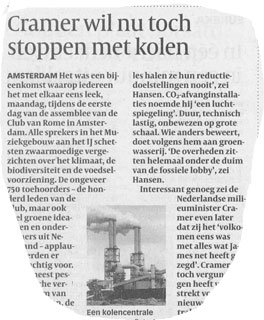According to de Volkskrant newspaper, the Dutch minister for energy, Jacqueline Cramer, has conceded that investing in coal-fired power stations may not be such a good idea after all.
“Coal-fired power stations must be abolished in the years to come. With these stations governments will never reach their national emission caps. Carbon capture and sequestration is a mirage. Governments are lead by the fossil lobby.”
According to de Volkskrant newspaper, the much-applauded statements above made by James Hansen, a Nasa researcher, during the meeting of the Club of Rome last Monday in Amsterdam were embraced by the Dutch minister for energy, Jacqueline Cramer, who also gave a speech at this meeting. And this is a remarkable turn of events, because a few years ago Cramer issued permits to energy companies to build four more coal-fired power stations.
“Cramer took a ‘laissez faire’ approach, and apparently she now realizes that that may not have been such a good idea,” says electricity market expert, Dr Laurens de Vries, of the Energy and Industry section (faculty of Technology, Policy and Management).
“Energy demand was rising in the Netherlands when she took her decision. She thought that energy companies would receive an incentive from the European market for carbon credits to invest in clean technologies.
“If more electricity would be produced with coal-fired power stations, the price of carbon credits would go up, she thought, which in turn would stimulate investments in clean energy because there is a cap on the total volume of carbon dioxide that may be emitted. If companies exceed the amount they may emit, they have to buy credits from other companies.”
Carbon credits are a key component of national and international attempts to mitigate the growth in concentrations of greenhouse gases. One carbon credit is equal to one ton of carbon and costs, at the moment, about 15 euro. All countries within the European Union participate in what is known as the European Emission Trading Scheme.
Until now companies received free credits, but between 2012 and 2020 the number of credits given away to the electricity sector will decrease to zero, allowing for the carbon trade to be really driven by the free market.
“The problem is that it’s very difficult for energy companies to estimate what the future price of the credits will be,” De Vries says. “That price depends on how many credits will be issued each year, on future energy demand and on the investment choices – in more or in less polluting technologies – by competing companies. Due to this uncertainty, the incentive to invest in for example carbon capture and sequestration or biomass is not very strong. Another problem is that energy companies are not necessarily affected that much by high prices for carbon credits. They can pass much of the cost of credits on to the consumers.”
Of course in the long run, these higher prices (which the custumer will have to pay) should provide an incentive for investment in cleaner energy alternatives. “But the transition to a more sustainable energy sector will take decades,” De Vries says. “Energy companies don’t look that far ahead. In the meantime, fossil fuel plants are economically still attractive. I think that Minister Cramer is now realizing that. She should have thought of it before she issued the permits for the current round of new coal plants. Now there is no way back and carbon capture and sequestration will be expensive at these plants.”
Musea en andere culturele instellingen moeten prioriteitenlijsten maken van hun cultureel erfgoed dat in geval van een ramp of calamiteit moet worden gered. Dat werd vorige week afgesproken op een symposium van de Mondriaan Stichting en het Nederlands Instituut Fysieke Veiligheid. Aanleiding was onder andere de brand bij Bouwkunde. De prioriteitenlijst zou rekening moeten houden met de cultuurhistorische en financiële waarde van objecten, maar ook met de omvang en het gewicht van de spullen die gered moeten worden.



Comments are closed.